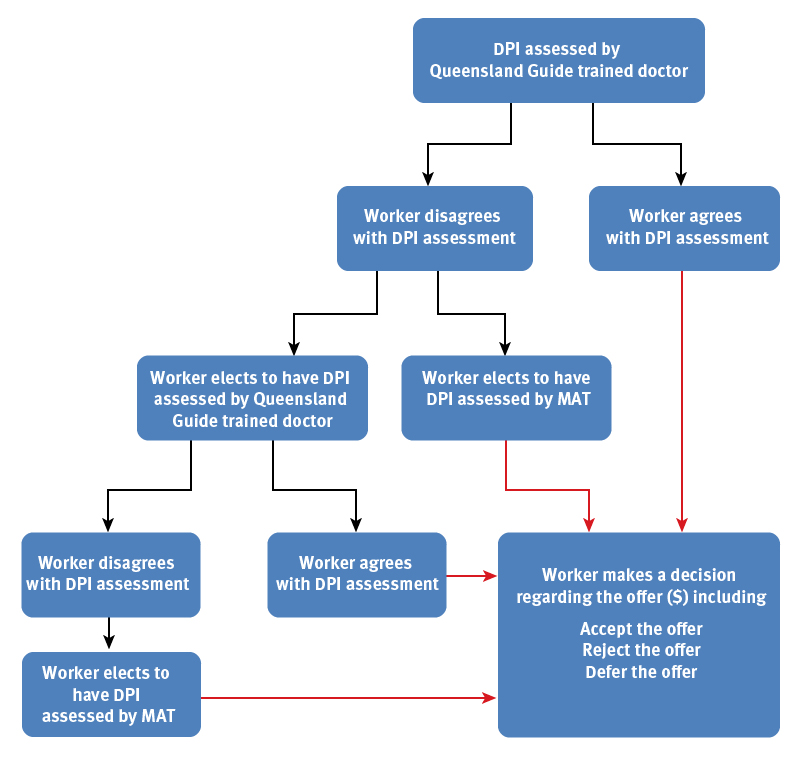Assessment for the Degree of Permanent Impairment
For workers injured from 15 October 2013, their injuries will be assessed using the Guidelines for Evaluation of Permanent Impairment (PDF, 2.05 MB) (the Queensland Guide).
For psychological and psychiatric injuries, the assessment must be conducted by the Medical Assessment Tribunal (MAT). There is no review process for these assessments. Further details on the review process are set out below.
The DPI assessment will be issued to the worker in the form of a Notice of Assessment (NOA), once all injuries are assessed. Where an assessment has been reviewed then any new DPI assessment replaces the previous assessment.
Where the injury has not been assessed by a Medical Assessment Tribunal (MAT), the worker must respond to the NOA within 20 business days if they do not agree with the DPI assessment and require a fresh assessment.
For physical injuries, if the worker disagrees with the original assessment by a Queensland Guide trained doctor (“doctor”), they can request referral to the MAT or ask the insurer to consider a medical review by a different doctor. WorkCover is required to decide within 10 business days of receiving the NOA response whether to have the injury re-assessed by a different doctor or refer it to the MAT.
Outlined below is WorkCover's protocol for arranging assessments of DPI and responding to requests for a new assessment.
What is sent to the doctor and/or MAT
WorkCover will send appropriate material from the worker's claim file to the doctor and/or MAT to enable assessment of the DPI. The claim file will include:
- Initial application form or computer-generated form if the application was made over the phone
- All medical and rehabilitation reports and records relevant to the injury
- Additional “relevant documents” as required by s499 and 510C to be provided to the Tribunal.
Choosing a Queensland Guide trained doctor
If a worker disagrees with the initial assessment of DPI, they have the option to nominate a doctor to conduct a fresh assessment of DPI.
WorkCover will only agree to refer a worker for an assessment of DPI if the doctor:
- has completed training in the Queensland Guide, and
- is from the relevant specialty based on the worker's injuries, and
- has availability to conduct the assessment and provide their report within two (2) months of the worker making the request, and
- agrees to provide their assessment and report in accordance with the Queensland Guide and for the fees provided in the Table of Costs.
View the register of permanent impairment trained assessors (XLSX, 0.11 MB).
Process for responding to DPI for Physical Injuries
Process for responding to DPI for Psychological and Psychiatric Injuries
For psychological and psychiatric injuries, the assessment must be conducted by the Medical Assessment Tribunal (MAT). Only the MAT can decide a degree of permanent impairment for a psychological injury.
The MAT is independent from WorkCover and is administered by the Workers’ Compensation Regulatory Services (WCRS). The Tribunal consists of a panel of three or five doctors who specialise in your type of injury. The tribunal doctors make a decision using the information provided by you and WorkCover, as well as from the medical examination and interview at your tribunal hearing. A written tribunal decision will be provided after the hearing. It will include the information considered by the tribunal doctors and their reasons for making the decision.
Medical assessment tribunal decisions are final. There is no review process for these assessments.
You can only dispute a tribunal’s decision by:
- asking WorkCover to consider new medical evidence up until 12 months after your hearing
- making an application for judicial review to the Supreme Court.
If you’d like to submit new medical evidence, you should discuss this with WorkCover, who will submit the information to WCRS.
A judicial review is a dispute against the process followed by the tribunal and doesn’t consider the medical matters of the decision. It requires you to establish that there was a breach of procedural fairness or an error of law in the decision making. It is recommended you seek independent legal advice on this option.
Additional information on the Medical Assessment Tribunal can be found here.
